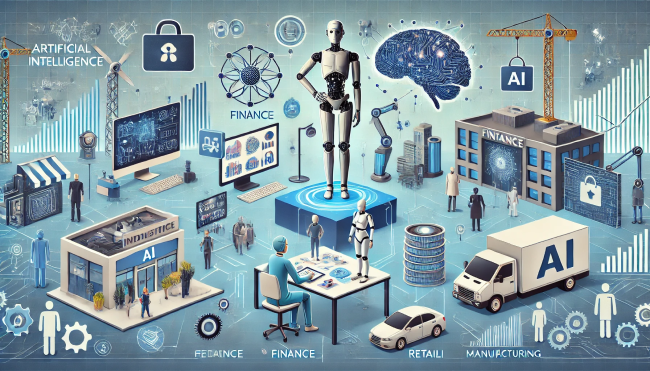How AI is Transforming the British Workplace

Since the adoption of the UK’s National AI Strategy in 2021, the integration of artificial intelligence into the British professional landscape has been steadily accelerating. As of now, one can safely state the technology has already penetrated all professional spheres, but as of 2024, the transformation is still ongoing. Generative AI technology continues to evolve, causing a chain effect of changes in job responsibilities and business routines. Below is a quick summary of industries and jobs most heavily affected by AI’s adoption in the workplace and an overview of the changes that are still to come.
The State of AI Adoption in 2024
According to Deloitte’s research, around 7 million people are already using AI at work, whereas the organisational trust in the technology has reached 72% – a rather steep surge since roughly half of organisations relied on AI in 2022. Logically enough, the investment portfolio is also growing. Tech Nation’s 2024 report indicates that in 2023 alone, UK tech startups raised $21.3 billion, with a fair share of these investments allocated to AI projects.
Currently, the compound annual growth rate of AI in the UK is estimated at 28.30%, which should result in a $26.89 billion market value by 2030. However, there is reason to believe that the actual CAGR will outperform these estimates, as it generally happens with new, rapidly evolving technologies.
Such a tangible increase in investment portfolio should keep accelerating the pace of technology’s adoption in UK organisations. Still, the biggest professional shift caused by current AI adoption is already evident because many businesses in the UK are struggling to fill their talent shortages – and not just in ML/AI engineering vacancies.
Transformations in job demand caused by AI
As of 2024, UK companies experienced marked talent shortages in the following roles:
ML, AI, and data science experts
According to the UK Job Market Update published in July 2024 on LinkedIn, the British tech industry has seen a 15% increase in the number of tech vacancies. Expectedly, the highest in-demand jobs in the tech niche are AI and ML experts, data scientists, cybersecurity experts, and software developers. The data is not surprising considering the pace of the IT industry – in the UK and worldwide.
While the shortage of ML, AI, and data science experts is self-explanatory, an increased demand for cybersecurity specialists is worth a separate mention. In the last two decades, GOV.UK has been recording a stable job decline in cybersecurity roles, which by 2024, has resulted in a sheer tech literacy crisis in the UK professional landscape. Employers report struggling to educate their staff about the basic rules of cyber hygiene, which logically increases business vulnerability.
Now, as more businesses understand the value and the vulnerability of data, the demand for cybersecurity experts is already pressing, and one can logically expect an increased interest in cybersecurity education programmes in the years to come.
C-level and managerial positions
In 2024, a contact lookup database, SignalHire, designed primarily for recruiters, conducted a study to analyse the most popular UK vacancies based on factual recruiters’ searches. Logically enough, data architects make it to the list of the top ten in-demand jobs but, curiously, not to the top of the list. Based on SignalHire’s data, managerial and C-level positions were the most common recruiters’ searches in 2024, which makes perfect sense considering the rapid transformation of the UK’s professional landscape.
As different industries adopt AI, many routine tasks become automated, calling for a complete makeover of organisational routines and structures. This calls for a new generation of leaders and managers who can oversee AI’s adoption on many business levels, from highest to lowest. Besides, AI’s potential for business is not fully uncovered yet, and British companies are still figuring out the most optimal ways of integrating technology into their routines. Once again, this requires innovative approaches to business management, often at the highest level.
These findings are supported by other research, indicating a high demand for skilled managers in the UK, with some even predicting a dire talent shortage before the decade is over. Right now, the need for skilled managers with an understanding of AI and industry-specific knowledge is most noticeable in:
- HR,
- Sales and marketing,
- Finance,
- IT and telecommunications.
Most of these industries are going through rapid transformation, with HRs and recruiters searching for ways to optimise their hiring strategies and approaches to staff management, whereas sales and marketing are exploring new opportunities to offer customers a highly personalised shopping experience. The finance industry is adopting more client-centric approaches while looking for ways to integrate AI technology into operational routines.
AI Ethics and Compliance Officers
Another in-demand occupation brought on by business adoption of AI, and like most new-collar jobs, a rather flexible one in terms of job responsibilities. In most cases, however, the job goes down to ensuring that AI systems, integrated into business routines, comply with laws, regulations, and, as the name suggests, ethical standards. The latter poses the greatest challenge since the ethical standards of using the technology are only vaguely defined. However, the UK is determined to ensure fair and legal use of artificial intelligence on a governmental level, which largely explains the increased demand for AI regulators and compliance officers.
Notably, careers in AI compliance will require a thorough understanding of AI and data science, along with profound knowledge of the specific industry in question. Often, it will need to be coupled with a legal degree as well, which also explains the dire talent shortage in this field – there are simply too few professionals who possess such an advanced set of diverse skills. However, as technology adoption accelerates, expectations from AI compliance officers might transform – and, hopefully, new training programmes will be introduced to address the talent shortage.
Industries Transforming Operations Through AI
Besides creating new jobs and increasing business demand for specific occupations, AI is steadily transforming operations in entire industries – a change most evident in:
- Healthcare, with the National Health Service actively searching for ways to integrate AI into patient diagnostics and subsequent care. To date, there has been significant progress in cancer diagnostics and MRI scan analysis.
- Finance, as ever more British banks and fintech firms leverage AI for real-time fraud detection and personalised financial advice. One of the brightest examples here is Barclays with its introduction of an AI-driven platform to personalise product recommendations.
- Manufacturing, especially in the automotive and aerospace segment, is relying on advanced robotics to streamline production timeframes, whereas AI systems ensure optimised maintenance and quality control monitoring.
- Retail is one of the first industries to grasp the power of AI for offering personlised shopping recommendations and analysing consumer behaviour. However, these examples barely scratch the surface of AI’s potential in retail, especially when predictive market analysis and business intelligence are concerned.
In late 2024, the British workplace is still being shaped by AI-driven innovation. Technology adoption is backed up on a governmental level, with the investment flow from public and private sources steadily increasing. Combined with AI’s potential to optimise routine business operations and boost corporate efficiency, the integration is on its way to becoming a professional standard. And even though many companies are struggling to find skilled professionals to fill new vacancies, there is reason to believe the professional market supply should soon catch up with demand.



